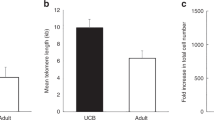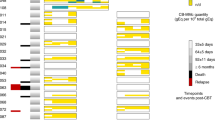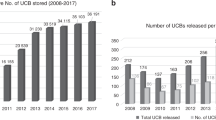Abstract
One of the main limiting factors for increased use of human umbilical cord blood (UCB) in adult allogeneic transplantation is the small number of progenitor cells that can be collected and infused. Ex vivo expansion of UCB might help to overcome this limitation. Whether an expansion of UCB cells will also lead to co-expansion of contaminating maternal cells, and thus may alter graft characteristics and lead to an increased incidence of GVHD, has not been looked at so far. We initiated cultures with UCB mononuclear cells (MNC) in a standard medium containing stem cell factor (SCF), flt-3L, Il-3, IL-6, EPO and G-CSF. To address the question of contaminating maternal cells we performed interphase FISH analysis of the X and Y chromosome simultaneously. Male (XY) cord blood samples were investigated for maternal (XX) cells at day 0 and at several time points during culture. We could not detect maternal cells in any of the nine samples studied when cultures were started at day 0. Culturing did not expand previously undetected maternal cells into a range that could be seen with FISH technology, as all samples remained negative for maternal cells throughout culture periods of 14 days. We then artificially contaminated male UCB with maternal mononuclear cells at concentrations of 5 and 15% at day 0. After 14 days, maternal MNC were still detectable, but the percentage was reduced to 1.7% and 6%, respectively. During culturing of CD34+-selected UCB the content of maternal cells also declined from a mean of 1.6% after contamination to 0.4% on day 7. Taken together we could show that maternal cells co-cultured with UCB do not co-expand and thus do not interfere with ex vivo expansion of UCB for adult allogeneic transplantation.
This is a preview of subscription content, access via your institution
Access options
Subscribe to this journal
Receive 12 print issues and online access
$259.00 per year
only $21.58 per issue
Buy this article
- Purchase on Springer Link
- Instant access to full article PDF
Prices may be subject to local taxes which are calculated during checkout
Similar content being viewed by others
Author information
Authors and Affiliations
Rights and permissions
About this article
Cite this article
Fietz, T., Hilgenfeld, E., Berdel, W. et al. Ex vivo expansion of human umbilical cord blood does not lead to co-expansion of contaminating maternal mononuclear cells. Bone Marrow Transplant 20, 1019–1026 (1997). https://doi.org/10.1038/sj.bmt.1701018
Received:
Accepted:
Issue Date:
DOI: https://doi.org/10.1038/sj.bmt.1701018
Keywords
This article is cited by
-
Undetectable leukemic blasts and absence of NOD/SCID leukemia-initiating cells in cord blood from a case of maternal AML
Bone Marrow Transplantation (2005)



